Home | Category: Jihadist Groups
MUSLIMS AND TERRORISM
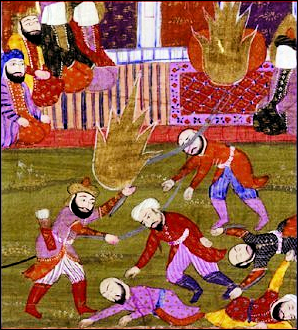
Jihad, Banu Qurayza In the mind of many Westerners, Islam and terrorism have become inextricably linked. Most terrorist acts are perpetrated by Muslims. Even before the September 11, 2001 attack on the World Trade Center in New York this was true. According to a survey by the Economist, 11 or 12 of the 16 major acts of terrorism between 1983 and 2000 were carried by Islamic groups and five of the seven states listed by the U.S. State Department for supporting terrorism were Muslim states. Yet, Islamic militants were immediately, and wrongly blamed after the bombing of building in Oklahoma City in 1995.
After the attack by Chechen militants on a school in North Ossetia, Russia in September 2004 — which left 331 people dead, including 186 children — Al-Rashed, the editor of the prominent Arab newspaper Asharq Al Aswat, wrote: “It is a certain fact that not all Muslims are terrorists, but it is equally certain, and exceptionally painful, that almost all terrorists are Muslims. What a pathetic record...We can not tolerate in our midst those who abduct journalists, murder civilians, explode buses; we can not except them, as related to us, whatever suffering they claim to justify with their criminal deeds. These are the people who have smeared Islam and stained its image.”
Many Arabs and Muslims say the connections between Muslims and Muslim groups and terrorism are unfair. On the Arab “street” and in the Arabic-language media the prevailing view often seems to be that suicide bombers are martyrs and so-called terrorists are freedom fighters engaged in jihad against infidels, invaders of Muslim land and Israel. A conference of Islamic nations was unable to define terrorism but it did declare that: 1) Israel engages in “state terrorism”; 2) the activities of Palestinian groups like Hamas are a form of “resistance” that don’t have anything to with terrorism; and 3) suicide bombing is a legitimate political instrument. Many Arabs view the campaign against terrorism as an attack on Islam.
The rise of Islamic consciousness and identity, some have argued, has arisen partly as a response to globalization, repressive governments and social problems. They argue there is a great deal of envy and hostility towards the West and its wealth, power and culture. This has coincided with a population explosion and economic shortcomings that have produced millions of idle young men, some of whom are anxious to vent their frustrations against the West. At the same time Islam has allowed Muslim to unite as a group against any perceived injustices against any of its members, such as the Palestinians.
Many Arabs and Muslims feel that anyone who kills themselves in order to defend their homeland or achieve rights for their people is a martyrs. Such deaths also justified in retaliation for the deaths of Muslim civilians and for the theft of their land. If only 1 percent of the world’s 1 billion Muslims have extremist and fundamentalist views and 10 percent of this 1 percent decide to join a group affiliated with Al-Qaida that adds up to 1 million individuals.
Moderate Muslims have been criticized not speaking out more against Muslim extremists and terrorists.
Websites on Muslims Divisions Divisions in Islam archive.org ; Shi’a History and Identity shiism.wcfia.harvard.edu ; What is Shi'a Islam? iis.ac.uk ; Four Sunni Schools of Thought masud.co.uk ; History of Islam: An encyclopedia of Islamic history historyofislam.com ; Oxford Encyclopedia of the Islamic World oxfordislamicstudies.com ; Sacred Footsetps sacredfootsteps.com ; Internet Islamic History Sourcebook fordham.edu/halsall/islam/islamsbook ; Islam IslamOnline islamonline.net ; Institute for Social Policy and Understanding ispu.org; Islam.com islam.com ; BBC article bbc.co.uk/religion/religions/islam ; Islam at Project Gutenberg gutenberg.org
RECOMMENDED BOOKS:
“Islamism and Islam” by Bassam Tibi Amazon.com ;
“Conservative Islam: A Cultural Anthropology” by Erich Kolig Amazon.com ;
“The History of Jihad: From Muhammad to ISIS” by Robert Spencer Amazon.com ;
“Suicide of Reason: Radical Islam's Threat to the West” by Lee Harris Amazon.com ;
“The Crisis of Islam: Holy War and Unholy Terror” by Bernard Lewis Amazon.com ;
“Salafism and Traditionalism: Scholarly Authority in Modern Islam”
by Emad Hamdeh Amazon.com ;
“The Making of Salafism: Islamic Reform in the Twentieth Century” by Henri Lauzière Amazon.com ;
“Sayyid Qutb and the Origins of Radical Islamism” by John Calvert Amazon.com ;
“Milestones” by Sayed Qutb Amazon.com
Islam and Aggression
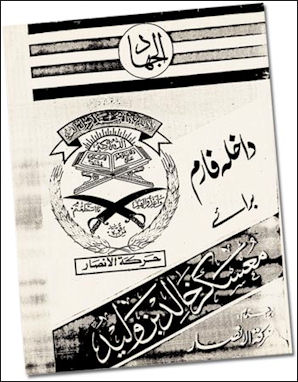
Jihad application form from
the Khalid bin Whalid training camp The historian Paul Johnson has argued that Islam is inherently intolerant and prone to violence. Samuel Huntington, a well known critic of Arabs and Muslims, predicted the great conflict of the 21st century will be between the Islamic world and the West. In his book “The Clash of Civilization and the Remaking of the World Order”, he wrote, “Muslims make up one fifth of the world’s population but in the 1990s they have been far more involved in intergroup violence than the people of any other civilization. The evidence is overwhelming.” Some see the relationship between Muslims and the Judeo-Christian West as a “long-lasting ideological struggle.”
Explaining why killing is done by Muslims, one Muslim man told National Geographic, “Our God does not want the people to be killing. Long ago the Muslim world was under attack by Christians who wanted to make all of Islam disappear from Earth. Jihad was about survival. For us jihad with weapons is a last resort. It is a very desperate thing. The greatest jihad, our God teaches us, is jihad of the heart.”
A passage in the fifth chapter of the Koran reads: “The only reward of those who make war upon Allah and His messenger...will be they will be killed or crucified or have their hands and feet on alternate sides of cut off...in the Hereafter theirs will be an awful doom.” There are equally harsh passages in the Bible. The Koran states war is justified only in self defense: “Fight in the cause of God those who fight you but do no transgress limits, for God loves not the transgressor. “
Lines from the Koran are often used as justification for violence and aggression. Like te Bible, the Koran is full of inconsistences and contradictions. Quotes from it can be used t justify almost anything. Some say the quotes used by an individual usually says more about the individual than the Koran.
Islam, Violence, Politics and War
Some scholars and politicians argue that the Cold War ended only to be replaced by a series of wars, conflicts and terrorist threats instigated by Muslims. Sometimes its seems like the news is dominated by an endless series of conflicts between Muslims and non-Muslims and between rival sects within Islam.
According to one survey 26 of the 50 ethnic conflicts in the 1990s — including ones in Kosovo, Bosnia, Macedonia, Chechnya, Azerbaijan, Tajikistan, Kashmir, India, the Philippines, Indonesia, Nigeria, Sudan, Nigera, and the Middle East — involved Muslims. A survey by the International Institute of Strategic Studies found that two thirds of the 32 armed conflicts that took place in 2000 involved Muslims.
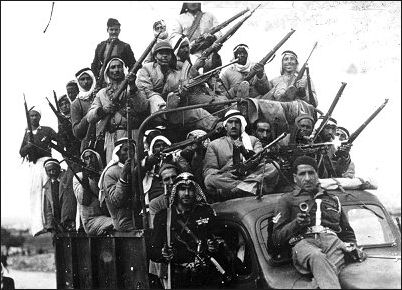
Arab volunteers But Muslims and Arabs are not the only people who have engaged in violence and terrorism. Christian extremists have bombed abortion clinics; Jewish radicals have slaughtered worshiping Muslims; and Hindu fundamentalist have egged on mobs to destroy mosques. There are verses in the Bible that condone retribution and “eye for an eye” justice. Many Christian saints are not all that different from Islamic martyrs.
Modern Muslim terrorism is rooted more in national liberation ideologies of the 19th and 20th centuries than they are in Islamic tradition. Although Muslim terrorists draw on Islamic scriptures, language and symbolism to justify their actions, their struggle is more of one of oppressed people against colonial occupiers. Farhad Khosrokhavar, a Paris-based expert of Muslim extremism, told Time, “Islam is a kind of refuge for those who are downtrodden and disenfranchised because it has become the religion of the oppressed. Previously, say, 20 years ago — they may have chosen communism or gone to leftist ideology. Now Islam is the religion of those who fought against imperialism, who are treated unjustly by the arrogant Western societies and so on.”
It has been suggested that the kind of tribalism which has traditionally looked to violence as a way to settle scores remains very much alive in the Arab world. Honor, martyrdom and tribal sacrifice, some say, are more valued than tolerance and compromise. What is different about today and the past as this relates to violence is that technology causes much more destruction and loss of life than in the past.
Mohammed, Fighting and War
Some scholars have argued that the relationship between violence and Islam can be traced back to Mohammed, who saw his share of action on the battlefield, and point out that Islam was spread through much of the world by military conquest.
One of the reasons why fighting and jihad play such central roles in the Koran and in Islam is that much of Mohammed’s life took place against a backdrop of tribal conflict and war. But once victory was secured, Mohammed devoted his attention to building a peaceful coalition of tribes dedicated to nonviolence.
Mohammed was an able military leader. He and his followers regularly defended Medina against attacks and regularly raided the rich Mecca-bound caravans and moved against hostile tribes, seizing booty and exacting tribute. Caravan raiding was not necessarily regarded as a crime in Arabia. It was viewed as a kind of sport and means of redistributing wealth. There were strict rules as to whom you could and couldn’t raid. Great care was taken to steal booty and livestock without harming anyone for the killing of people could trigger a nasty blood feud that could last for generations.
Mohammed himself participated in the raids, including one during the holy month of Rajab when fighting was prohibited. He was wounded on at least one occasion. Mohammed stint as a caravan raider occurred after he organized his followers into a political community. Hostilities continued for seven years. During that time the Jewish tribes of Medina became opponents and bedouin tribes from Western and Central Arabia gradually were incorporated into the Mohammed community. According to Muslim tradition, Mohammed expelled the tribes of Jews from Medina — and killed adult males in his tribe, which he suspected of collaborating with the Meccans in a battle against Medina.
Battle of Badr: Mohammed Defeats the Meccans
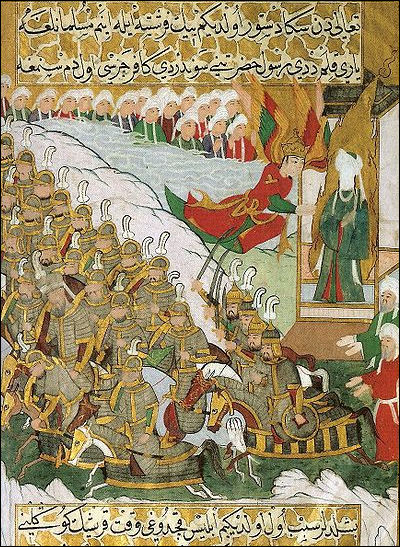
Muhammad at Badr Mohammed and his raiders planned to raid the annual caravan from Damascus to Mecca, which included more than a thousand camels. Tipped off, the Meccans sent a reinforcements to defend the caravan. At the wells of Badr, near the Red Sea, there was a fierce battle. Mohammed said, "All those who die today will enter paradise!" Although they were outnumbered three to one, the story goes, Mohammed 's disciplined 300-man army routed the undisciplined Meccans. The Battle of Badr in 624 was a stunning victory for the Muslims. Bedouin fighters impressed by their courage joined them.
A year later at Mount Uhud near Medina, when the Meccans retaliated with the aim of not only defeating the Muslims but exterminating them. They almost succeeded. Many Muslims were killed. Mohammed nearly died. He was wounded in the face by a stone, then hit in his helmet with swords. Bleeding and unconscious, he was pulled from the battle fields by his companions. Muslims vented their anger at Jewish tribes in Medina, who were expelled for supporting the Meccans. By some accounts Muslims in Medina murdered 700 Jews.
One of the reasons why fighting and jihad play such central roles ins the Koran and Islam is that much of Mohammed’s life took place at a time of tribal conflict and war. Once victory was secured, Mohammed devoted his attention building a peaceful coalition of tribes dedicated to nonviolence.
In 627, around 3,000 Muslims routed the 10,000-man Meccan army in the Battle of the Trench, so called because the Muslims dug a great trench outside of Medina, which thwarted the Meccan cavalry charges. This was followed by a massacre of the Qurayzah Jewish tribes which had collaborated with the Meccans, an act that seems unnecessarily cruel in today’s terms but was well within the terms of what was regarded as acceptable in ancient Arab warfare.
The victory was a great boost for Mohammed and Islam. Arabs saw Mohammed as a star on the rise. They also saw that the gods of the Meccans didn’t help them and so maybe there was something to the one God religion pushed by Mohammed. New tribes and Meccan defectors joined the Muslim forces.
Mohammed followed up the victory over the Meccans by organizing a pilgrimage to Mecca. He was accompanied by about 1,000 unarmed followers. Mohammed believed the Meccans wouldn’t attack them and break Mecca’s status as a peaceful sanctuary. The Meccans did try to attack them but the Mohammed and his followers were able to elude them with the help of Bedouins. In 628, the Meccans were pressured by peaceful demonstrations to sign the Treaty of Hudaybiyyah. This opened the floodgate for new converts to embrace Islam.
Koran and Violence
The Koran contains occasional references to violence and revenge just as the Bible and Torah do. In one passage, Muslims who meet armed resistance are advised to: “Fight them [nonbelievers] so that Allah may punish them at your hands, and put them to shame.”
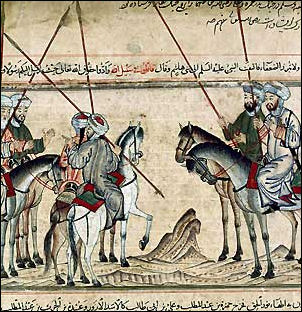
Battle of Badr Violence is only permissible for self defense. According to Koran 2:190, 2:191 and 2;217 warfare is always evil but is sometime justified if Muslims are being persecuted and to preserve values. The Koran quotes the Torah on eye-for-an-eye retribution but also says it is better to forgive than seek revenge (5:45) and says that conflicts should kept short and violence must end as soon as one side sues for peace (2: 192-3). It also lays out strict rules for engagement that prohibit killing noncombatants, women, children and even trees.
Some scholars argue that references to violence in the Bible and Torah are not regarded as divine commands as those in the Koran are. Another difference is that there is no authoritative interpretation of Koranic scriptures dealing with violence and Muslims can interpret them in a number of different ways. One such passage reads: “Once the Sacred Months are past (and they refuse to make peace), you may kill the idol worshipers when you encounter them, punish them, and resist every move they make. If they repent and observe the Prayers and give the obligatory alms-giving you shall let them go.”
Unlike the holy books of Judaism and Christianity, the Koran and the hadiths contain verses that precisely define and set the rules for conduct in war and exhorts Muslims to wage battle against their enemies. It has been argued that Christians such as the Crusaders may have committed terrible atrocities but they didn’t have any statements from Jesus to justify their actions. It has also been pointed out that while Mohammed led armies against his oppressors, Jesus allowed himself to be crucified.
Misreading the Koran and Violence
Almost all verses in the Koran that evoke violence are followed by calls for peace. In Koran 4:89 Muslims are ordered by God to “slay [enemies] wherever you find them!”...Slay them...and drive them out of the places whence they drove you out.” The scripture is often evoked by Osama bin Laden and other Islamic terrorists to justify their actions. It was written at a time when warriors were not expected to spare survivors. Even it is followed by the verses in 4:90: “Thus, if they let you be, and do not make war in you, and offer you peace, God does not allow you to harm them.”
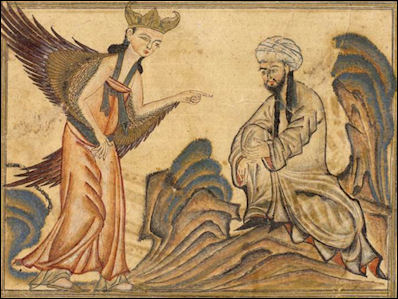
Mohammed receiving revelation
from the angel Gabriel It is often said that Islam was imposed by the sword. One famous passage from the Koran goes: “He who will abide by the Koran will prosper, he who offends against it will get the sword.” But the Koran also states; "There is no conversion in matters of faith!” (2:256) and repeatedly calls on Muslims to respect Jews and Christians — The “People of the Book,” who worship the same God (29:46).
In one of his last sermons Mohammed relates how God told humans: “O people! We have formed you into nations and tribes so that you may know one another” (49:13). The violence that is done in Islam’s name is often done by people have misread the Koran as a whole and quote incomplete passages from it and distort its meaning to fit their agenda.
Before terrorists beheaded the American hostage Nick Berg before a video camera in Iraq, the killer and terrorist leader Abu Mousab al-Zarqawi intoned the following passage from the Koran: “has the time not come for you to lift the sword, which the master of the messengers [Mohammed] was sent with? The Prophet...has ordered it cut of the heads of the prisoners of Badr...He is our example.” Religious scholars have said that the passage was taken out of context: that beheading is condoned only in the heat of battle.
Islam, Peace and Tolerance
The word “Islam” comes from the same root as the word “salaam” which means peace. Islam strictly prohibits aggression, unjust violence and the harming of others, and encourages tolerance, forbearance and forgiveness. The Koran states: "Fight in the way of God against those who attack you but begin not hostilities. Verily, God loveth not the aggressors . And if they (enemies) incline towards peace, incline thou also to it, and trust in God.”
Support for tolerance is found in sura 109: “Say: O ye that reject Faith! I worship not that which ye worship. Nor will ye worship that which I worship. And I will not worship that which ye have been wont worship. Nor will ye worship that which I worship. To you be your Way, And to me mine.”
The quote from the Koran that states "there is no compulsion in religion" is viewed as evidence that at its core Islam is a moderate and tolerant religion. In his book “The Spirit of Islam”, Syed Armmer Ali writes, "Islam raises the sword in self-defense, and held it in self-defense, as it will forever do. But Islam never interfered with the dogmas of any moral faith. It never invented the rack or the stake for stifling differences of opinion, or strangling the human conscience, or exterminating heresy." [Source: "What Everyone Should Know about Islam and Muslims" by Suzanne Haneef, Kazi Publications]
Muslim Law and Terrorism
.jpg)
Gaza Kindergarten Graduation The Prophet said do not kill women, children, hermits, farmers plowing their fields, and people without weapons. The Koran says: “If you’ve killed an innocent person it’s as if you’ve killed humanity.” A central precept of Islam is that the injustice of others does not justify one’s own injustice. Self defense is regulated by Muslim law, and politics and the law are not be mixed.
Muslim jurists have traditionally looked upon terrorist attacks as the most heinous and immoral crimes because: 1) the victims are innocent and defenseless; and 2) the sneaky way in which victims are killed is regarded as cowardly and doesn’t give victims a chance to defend themselves. Among the crimes that fall into the same category as terrorism are abductions, poisoning of water supplies, arson, attacks against travelers, assaults that take place after dark and rape. For these crimes, Muslim jurists often call for the harshest penalties, sometimes death.
Osama bin Laden sought support from the Koran and the Hadiths for his belief that the killing of innocent people and committing suicide were justified in the cause of jihad even though the vast majority of Islamic scholarship on these points contradicted him. He wrote his fatwas in the subject and scoured the Koran and the Hadiths for quotes and found scholars with dubious credentials to back him up. Rather than gaining supporters in the Islamic scholarly community Al-Qaida doctrines have spurred Islamic scholars to re-examine texts that have been used to justify things like violence, jihad and discrimination of women and find ways to discredit them.
Islam and Terrorism Inextricably Linked?
.jpg)
Gaza Kindergarten Graduation Phillip Blond and Adrian Pabst wrote in the New York Times: Most commentators argue that Islamic terrorism is a fanatical perversion of Islam which deviates from its true teachings. They call for a Western-style modernization of the Muslim world, hoping thereby that radical Islam will be tamed. This analysis misses the point. The nature of the terrorist threat is unambiguously Islamic and is not so much a deviation from Muslim tradition as an appeal to it. Al Qaeda's ideology draws on two traditions to legitimize itself: one classical, the other modern. [Source: Phillip Blond and Adrian Pabst, New York Times, July 28, 2005]
“Regarding classical Islam, the oft-quoted remark that Islam is a religion of peace is false. It is historically illiterate to claim that war is foreign to Islam and it is theologically uninformed to argue that jihad is merely a personal inner struggle with no external military correlate. On the contrary, Islam is linked from the beginning with the practice of divinely sanctioned warfare and lethal injunctions against apostates and unbelievers. Islam experienced no period of wandering and exclusion; from its inception, Islam formed a unitary state bent on military conquest.
“The Prophet died a successful military leader who created a single Islamic polity that expanded - through warfare - all over the known world. The caliphate combined the double logic of a religious community and an imperial state. This dual identity explains how Islam can be simultaneously peaceful and warlike. While the Koran enjoins that there shall be "no compulsion in religion," Islam still regards it as a holy duty to extend militarily the borders of the House of Islam against the demonic world of unbelievers: "He who dies without having taken part in a campaign dies in a kind of unbelief."
“Coupled with this irreconcilability between Islam and its enemies is an extreme territorial sense of the sacred. Hence bin Laden's principal demand for the departure of all infidels from holy Muslim lands. When extremists say they are killing in the name of Islam, they are in part appealing to Islamic traditions of long standing.
Roots of Islamic Terrorism
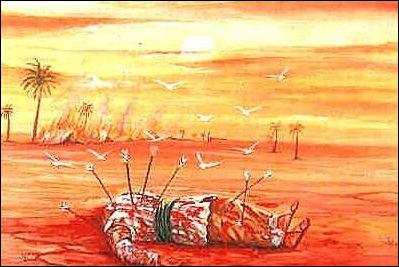
Shiite martyr Imam Hussein's
body without head Phillip Blond and Adrian Pabst wrote in the New York Times: “Al Qaeda's modern origins go back to Wahhabism, named after the revivalist movement founded by Muhammad Ibn'Abd al-Wahhab in 1744. Wahhab called for a return to a pure and unadulterated form of Islam closer to the ideals of the Prophet. Faced with a decadent society, Wahhabism (not unlike some radical Protestant sects) reduced Islam to a scriptural literalism, an absolutism utterly hostile to other more medieval traditions. In this sense of direct rule by God. Wahhabism is a truly modern theology. Not unlike Descartes and Kant, it argues for the unmediated and total knowledge of its object. [Source: Phillip Blond and Adrian Pabst, New York Times, July 28, 2005]
“Al Qaeda then blended this theology with fascism. The Indian Muslim Abu Ala Maududi (1903-1979) condemned the degraded nature of all contemporary Muslim communities. He characterized Muslim governments that did not implement stringent Islamic law as apostate and commanded true believers to wage jihad against them. Maududi was a decisive influence on Sayyid Qutb (1906-1966), chief ideologue of the Muslim Brotherhood. Like Maududi, Qutb fused the history of Mohammed's travails with a revolutionary vanguard-type ideology that removed medieval limits on warfare by championing a modern death cult in the quest for a revivified caliphate.
“The ideology instigated by these two figures is fuelled by dreams of a prior Islamic golden age. Al Qaeda sympathizers avidly read European fascist literature and pursue religious ends via atheist methods. Recruits to the cause are not the excluded uneducated poor, they are intellectuals with a radical critique of Western society and its impact on Islam. Neither the "war on terror" nor political negotiations will overcome Islam's totalitarian turn. Western repression is everywhere fuelling the ranks of radical Islam. Equally, there can be no accommodation with an ideology that seeks to fashion the whole world in its own image. The essentially Islamic nature of this terror demands nothing less than a reformation in the name of an alternative Islam. Islam, with good reason, will never embrace Western secularization. But it could begin to develop a critique of its history by recovering some of its aborted traditions. Islam must place true religious conversion (like that of Sufism) over territorial conquest. Islam needs to restore the legislative authority of communal consensus to allow Muslims to develop along with, rather than against, the future.
Peter Bergen wrote in the Washington Post: “For those of us hoping that chapter [on terrorism] can someday be closed, one name should be sobering: the Faqir of Ipi. The Faqir was a Muslim religious leader who waged a guerrilla war against the British in Pakistan's tribal regions during the 1930s and 1940s from his base in North Waziristan. As many as 40,000 British and Indian soldiers deployed to the area to hunt him down. They never found him. He died in his own bed in 1960 - reportedly from a severe case of asthma. [Source: Peter Bergen, Washington Post, January 28, 2011]
See Wahhabism, Islam and Politics
Somalia's 'Mad Mullah' as a Precursor of Osama Bin Laden
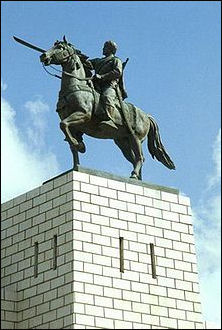
Statue of Sayyid Mohammed
Abdullah Hassan in Somalia Jeffrey Bartholet wrote in Newsweek, “At Dul Madoba, which means Black Hill in Somali, a jihadist known to his enemies as the Mad Mullah enjoyed a great victory in 1913... Every Somali with an education knows what happened here, back when the area was a protectorate ruled by British authorities. Some have memorized verses of a classic Somali poem written by the mullah. The gruesome ode is addressed to Richard Corfield, a British political officer who commanded troops on this dusty edge of the empire. The mullah instructs Corfield, who was slain in battle, on what he should tell God's helpers on his way to hell. "Say: 'In fury they fell upon us.'/Report how savagely their swords tore you." [Source: Jeffrey Bartholet, Newsweek, September 30, 2009]
“The mullah urges Corfield to explain how he pleaded for mercy, and how his eyes "stiffened" with horror as spear butts hit his mouth, silencing his "soft words." "Say: 'When pain racked me everywhere/Men lay sleepless at my shrieks.' " Hyenas eat Corfield's flesh, and crows pluck at his veins and tendons. The poem ends with a demand that Corfield tell God's servants that the mullah's militants "are like the advancing thunderbolts of a storm, rumbling and roaring."
“They rumbled and roared for two full decades. The British launched five military expeditions in the Horn of Africa to capture or kill Muhammad Abdille Hassan, and never succeeded (though they came close). British officers had superior firepower, including the first self-loading machine gun, the Maxim. But the charismatic mullah knew his people and knew the land: he hid in caves, and crossed deserts by drinking water from the bellies of dead camels. "I warn you of this," he wrote in one of many messages to his British foes. "I wish to fight with you. I like war, but you do not." The sentiment would be echoed almost a century later, in Osama bin Laden's 1996 declaration of war against the Americans: "These [Muslim] youths love death as you love life."
“History doesn't really repeat itself, but it can feed on itself, particularly in this part of the world. Sagas of past jihads become inspirations for new wars, new vengeance, until the continuum of violence can seem interminable. In the Malakand region of northwest Pakistan, where the Taliban today has been challenging state power, jihadists fought the British at the end of the 19th century. In Waziristan, a favored Qaeda hideout, the Faqir of Ipi waged jihad against the British in the 1930s and '40s. Among the first to take on the British in Africa was Muhammad Ahmad, the self-styled "Mahdi," or redeemer, whose forces killed and beheaded Gen. Charles George Gordon at Khartoum. But no tale more closely tracks today's headlines, and shows the uneven progress of the last century, than that of Muhammad Abdille Hassan.
“His story sheds light on what is now called the "forever war," the ongoing battle of wills and ideologies between governments of the West and Islamic extremists. There's no simple lesson here, no easy formula to bend history in a new direction. It's clear, even to many Somalis, that the mullah was brutal and despotic, and that his most searing legacy is a land of hunger and ruin. But he's also admired — for his audacity, his fierce eloquence, his stubborn defiance in the face of a superior power. Among Somalis, the mullah's sins are often forgiven because he was fighting an occupier, a foreign power that was in his land imposing foreign values. It is a sentiment that is shared today by those Muslims who give support to militants and terrorists, and one the West would do well to better understand.
Rise of the Mad Mullah
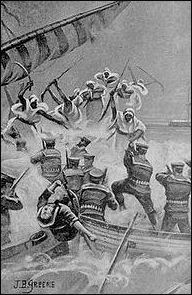
Somali warrior-dervishes fight
a British naval batilla Jeffrey Bartholet wrote in Newsweek, “Muhammad Abdille Hassan was slightly over six feet tall, with broad shoulders and intense eyes. Somalis called him Sayyid, or "Master." (They still do.) He got much of his religious training in what is now Saudi Arabia, where he studied a fundamentalist brand of Islam related to the Wahhabi teachings that have inspired Al Qaeda. Stories abound about how he came to be called the Mad Mullah. According to one popular version, when he returned to the Somali port of Berbera in 1895, a British officer demanded customs duty. The Sayyid brusquely asked why he should be paying a foreigner to enter his own country. Other Somalis asked the Brit to pay the man no mind — he was just a crazy mullah. The name stuck. [Source: Jeffrey Bartholet, Newsweek, September 30, 2009]
“Many Somalis would come to think him mad in another sense — that he was touched by God. "He was very charismatic," says historian Aw Jama Omer Issa, who is 85 years old and interviewed many of the Sayyid's followers before they died off. "Whenever you came to him, he would overwhelm you. You would lose your senses—to whomever he hated, he was very cruel. To those he liked, he was very kind." His forces wore distinctive white turbans and called themselves Dervishes.
“The first British officer to hunt the mullah and attempt to crush his insurgency was Lt. Col. Eric Swayne, a dashing fellow who had previously been on safari to Somaliland, hunting for elephant and rhino, kudu and buffalo. He was dispatched from India, and brought with him an enterprising Somali who had once worked as a bootblack polishing British footwear. Musa Farah would serve one British overlord after another. He would gain power, wealth, and influence beyond anything he could have imagined, including a sword of honor from King Edward VII.
“Swayne's orders were to accept nothing short of unconditional surrender. For intelligence he relied on Dervish prisoners, who sometimes gave him false information. "We were in extremely dense bush, so I decided to move on very slowly, hoping to find a clearing, which was confidently reported by prisoners," Swayne wrote in one after-action report. But the bush only became thicker. Soon the Dervishes were advancing from all sides. Men and beasts fell all around, as great shouts of "Allah! Allah!" rang out. Somali "friendlies" panicked and fell back. Pack animals stampeded"a thousand camels with water tins and ammunition boxes jammed against each other “scattering their loads everywhere."
“The British faced an enemy "who offered no target for attack, no city, no fort, no land — in short, there was no tangible military objective," wrote Douglas Jardine, who served in the Somaliland Protectorate from 1916 to 1921 and later wrote a history of the conflict. One defeat was so humiliating that some British soldiers imagined they had seen a "white man" among the Dervishes — how else could these "natives" be inflicting so much pain? At times, the British coordinated with forces from Christian Ethiopia in an attempt to trap the mullah. The Dervishes were able to avoid capture by crossing the border into Italy's colonial territory to the south.
Churchill and Final Campaign To Get the Mad Mullah
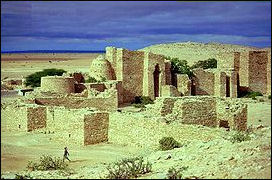
Taleh Castle Jeffrey Bartholet wrote in Newsweek, “As the mullah gained strength and power, some British politicians argued for a more aggressive stance?a "surge," in today's parlance. Others thought the whole enterprise was a waste of re-sources. Among the latter was Winston Churchill, who briefly visited Somali-land in 1907 when he was undersecretary of state for the colonies. [Source: Jeffrey Bartholet, Newsweek, September 30, 2009]
“Churchill had already engaged other "mad mullahs." As a young man, he served as a military correspondent in the North-West Frontier province of what is now Pakistan, where he battled jihadists and wrote about it in his first book, The Story of the Malakand Field Force. Then he fought the followers of the Mahdi at Omdurman, in Sudan. He disparaged Islam. "Individual Muslims may show splendid qualities?but the influence of [this] religion paralyses the social developement [sic] of those who follow it," he wrote in The River War: An Historical Account of the Reconquest of the Soudan. "No stronger retrograde force exists in the world." (In the same passage, he also noted that the "civilization of modern Europe" had been able to survive largely because Christianity "is sheltered in the strong arms of science.")
“After seeing the Somaliland port of Berbera, Churchill wrote a tough-minded report. "The policy of making small forts, in the heart of wild countries?is nearly always to be condemned," he wrote. Britain should withdraw from the interior and defend only the port of Berbera. After much debate, London ordered a policy of "coastal concentration." Officers in Somaliland could further arm the "friendlies," but were not to engage the mullah themselves. Chaos ensued, as clans battled each other for ascendancy and loot. Tens of thousands of Somalis were killed.
“This was the dilemma that Corfield faced in 1913. The son of a church rector, he had a moralistic streak. But he'd also served in the Boer War and was "made of stuff that does not thrive in offices," wrote biographer H. F. Prevost Battersby. When the Dervishes began marauding against friendly clans, Corfield rashly defied orders and went in pursuit. A Dervish soldier shot him dead 25 minutes after the battle at Dul Madoba began. Some of the mullah's fighters later took Corfield's severed arm as a war trophy to present to their master. "It was a great morale booster for the Dervishes, no doubt about it," says the Somali-born Rutgers historian Said Samatar. "Corfield was a symbol — the British colonial man. In a sense it was a blow against colonialism."
“To some in Britain, Corfield was a fool who damaged national prestige by disobeying orders. To others, he was a man of principle — he was "the straightest, whitest, most honorable man I have ever met," said one colleague, displaying the casual racism of the time. The prevailing view was that Corfield's death had occurred, in part, because the British had encouraged the mullah by withdrawing to the coast and seeming reluctant to fight. It "had been proved once more that 'there is nothing so warlike as inactivity,' " wrote Jardine.
“The decisive turn in the conflict came only years later. In 1920 a decision was taken to send warplanes — one of the early uses of air power to put down an insurgency. Churchill, by now the minister of war and air, had become convinced that air power could do what ground forces had never been able to accomplish. He was instrumental in getting backing for the mission. The Z Unit arrived in Somaliland disguised as geologists, and assembled the de Havilland 9A planes on site. By this time, the mullah had grown tired of running around the bush and had built many stone forts. On Jan. 21, 1920, he awoke at his fort in Medishe expecting nothing out of the ordinary. He was sitting on a balcony with his uncle, other Somalis, and a Turkish adviser.
“According to Jardine's account, Somali aides suggested the spectral objects coming out of the sky might be the chariots of God coming to escort the Sayyid to heaven. But five minutes after a first pass, the pilots returned and dropped bombs. "This first raid almost finished the war, as it was afterwards learned that a bomb dropped on Medishe Fort killed one of the mullah's amirs on whom he was leaning at the time, and the mullah's own clothing was singed," wrote Flight Lt. F. A. Skoulding, who took part in the raid.
“For two weeks the planes provided air support to ground forces — including some organized by the mullah's Somali nemesis, Musa Farah. But the mullah, hiding in caves and outwitting his pursuers, again managed to escape. The British made a peace offering; the mullah responded by listing conditions of his own, including a payment of gold coins, diamonds, cash, pearls, feathers of 900 ostriches, two pieces of ivory, and books, all of which he said had been taken from him. Somali allies of the British chased him farther into the bush, where he aimed to rebuild his forces once more. But the mullah succumbed to flu later that year. With his death, his Dervish movement died out. Jardine didn't gloat. "Intensely as the Somalis feared and loathed the man whose followers had looted their stock, robbed them of their all, raped their wives, and murdered their children, they could not but admire and respect one who, being the embodiment of their idea of Freedom and Liberty, never admitted allegiance to any man, Moslem or Infidel," he wrote.
Image Sources: Wikimedia Commons, except Gaza Kindergarten Graduation, Israel Defense Forces
Text Sources: Internet Islamic History Sourcebook: sourcebooks.fordham.edu ; Arab News, Jeddah; “Islam, a Short History” by Karen Armstrong; “A History of the Arab Peoples” by Albert Hourani (Faber and Faber, 1991); “World Religions” edited by Geoffrey Parrinder (Facts on File Publications, New York); “Encyclopedia of the World’s Religions” edited by R.C. Zaehner (Barnes & Noble Books, 1959); Metropolitan Museum of Art, Encyclopedia.com, National Geographic, BBC, New York Times, Washington Post, Los Angeles Times, Smithsonian magazine, The Guardian, Al Jazeera, The New Yorker, Time, Newsweek, Reuters, Associated Press, AFP, Library of Congress and various books and other publications.
Last updated April 2024
